Testimonies collected on board the MY Phoenix during search and rescue operations.
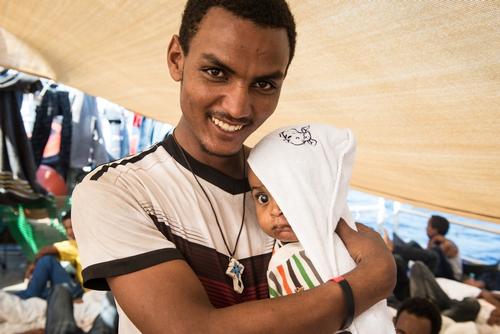
Michael
"The only solution is to leave and we can’t ask for help from other governments, so we choose to go the dangerous way."
"Life in Eritrea is sweet but our government is cruel, the laws are out of control. We have enough food, enough water and enough work but there are no rights, there is no democracy. The only solution is to leave and we can’t ask for help from other governments, so we choose to go the dangerous way. We choose to put ourselves in the hands of God.
When I told my mother I was going to Libya to try to get to Europe, she begged me not to do it. She was afraid because many, many Eritrean people have died this way. Three years ago my best friend died on his way to Europe and a few months ago my uncle tried but was taken by Daesh [Islamic State] and killed. But I couldn’t listen to my mother, I knew the journey would be long and dangerous but there’s no opportunity at home.
I first tried to leave in 2012 but I was caught and put in prison. I eventually made it to Ethiopia where there is democracy, but no work. I then went to Khartoum in Sudan and started my journey through the desert to Libya.
The Sahara is a very dangerous place, you see many dead people. Six of the people travelling with me died on the way to Ajdabiya. Ajdabiya is a hungry city and it is where we paid the smugglers. It was big money but my brother, who is in Israel, and my wife’s sister, who is in Sweden, helped us.
The trip to Tripoli passed through many checkpoints and took eight days. We were terribly afraid. If Daesh finds you, they will kill you and if the police find you, they will rob you. In fact, in Libya, it seems like every man, big or small, has a gun. Once we made it to Tripoli we lived in a big house with 700 other people divided into men and women and by nationality. At night we didn’t sleep because we could hear gunshots and fighting outside -there is no peace in Libya.
After 12 nights in Tripoli we were put on a small rubber boat in the middle of the night. Then, they took us, group by group, to a bigger wood boat. I was was with about 200 men in the hull of the boat, under the deck - water was coming in, it was very hot and the engine was making so much noise. The women, the children and three 'drivers' were on top but they were people like us, not smugglers, not captains. We prayed and most girls cried, everyone begged God to allow us to survive.
After seven hours we found the MY Phoenix and we were saved. Now I want to go to Sweden. There it is nice and they know about Eritrea’s problems and they will help us. My wife wants to go to Holland but we’ll talk about that."
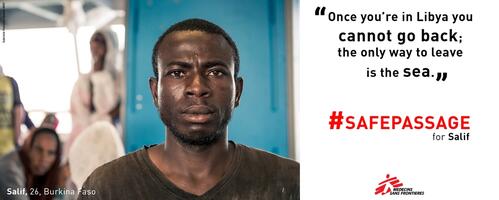
Salif
"I wanted to leave but once in Libya you cannot exit the country by land, the only way you can leave is by sea."
"I am my mother’s oldest son so when my father died, I had to quit school and start working. Where I come from it is hard to make a living and if you don’t have the means to provide for your family, it is humiliating. Our government is corrupt, only those who are well connected benefit from government aid and government jobs. So I was forced to take to the road and search for better opportunities. I had heard from friends who left years ago that there were jobs in Libya, so I decided to go there.
When I arrived in Niger, I paid some people to take me from Agadez to Saba. When I arrived in Saba, the same people immediately detained me and told me I had to pay for my freedom. I told them I already paid for my transport all the way to Libya but that didn’t matter to them and after five days I called my family who sent the money to my kidnappers.
After I was freed, I started working with someone from Burkina Faso who offered me 10 dinars (EUR6.50) per day for work as construction worker. The work was hard and painful for me but I did it because I needed money. I worked for 40 days but was never paid. I found other jobs and, as soon as I gathered enough money, I went to Tripoli hoping for a better situation.
When I arrived in Tripoli, I met an African who had been living there for a while. I explained that I needed help because I didn’t know the city. He took me to an apartment building where only Africans lived and told me I could stay there with them. Life in Tripoli was much harder than in Saba. Even the people who drove us to Tripoli treated us very badly and beat us often. All of us tried to hide from the police.
One day I was told of a person who made it to Europe and he gave me the contacts for a man with a boat. I wanted to leave and once in Libya you cannot exit the country by land, the only way you can leave is by sea. So I called this man with a boat and we agreed I would pay him 900 dinars (EUR600) for the trip to Italy.
Once we saw the rubber boat, we realised how dangerous the journey at sea would be. Around 30 minutes before we met the rescue ship our rubber boat started leaking. When the rescue boat arrived, they told us to be patient, to get on the ladder one by one, but some of us did not manage to be patient. At one point everybody tried to save themselves and a lot of people fell into the water but now I am safe.
I left home so I could to provide for my mother. I pray that I can make her comfortable. For now, I would like to go to England or Switzerland. But most of all, I hope one day I will be able to go back to Burkina and hug my mum."
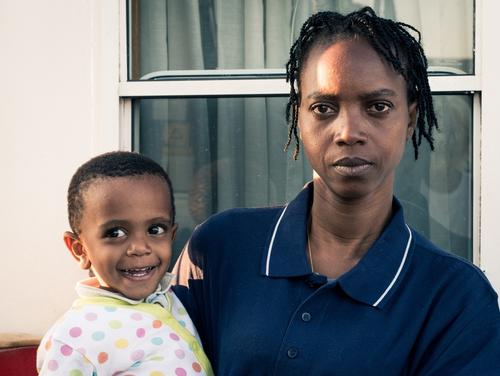
Batu
"Life in Sierra Leone seems to be difficult because of Ebola but that is not why I am here."
I am married to a Lebanese man that I met in Sierra Leone after my first husband, with whom I had two boys, died 12 years ago. We had three more children together and at first, we had money but in 2012 we started struggling. So we went back to his family in Lebanon.
They didn’t like me. My father in law, my mother in law, his brothers and his sister all disliked me. They said that their son must not marry a black woman. When I gave birth to my children, they were darker than the Lebanese people, so his family hit me. We suffered a lot and even eating was a problem because my husband didn’t have a job.
Eventually they sent me back to Sierra Leone and allowed me to take only the youngest of my children with me, two year old Mohammed. I had no choice but to take him and leave the others behind.
Back in Kailahun, one of my friends told me his sister was in Libya and that I should go meet her. They gave me the number of a driver and soon I had borrowed enough money for the trip. The travel was difficult, we had very little food and the people along the way really harassed us. The men asked us to have sex with them, they did that to me many times. When they see you have a baby they ask you if you’re married and sometimes they leave you in peace. But the single girls … they do whatever they want to them and beat them if they refuse.
Once in Libya, I went to Tripoli but I had no money and I needed to find a job. I found a man who needed care and a housekeeper and I worked for him but for a black person it is not easy to live in Libya. If they see you in the streets they take everything from you, sometimes they beat you, kidnap you and even kill you. In the nights they shoot, shoot, shoot. People break into your house, take your money and all you have. They say that this is their country’s money and we have no right to have it. That’s why black people stick together, it is safer that way.
I had planned to stay in Libya but the conditions were so bad that after a month, I decided to go to Europe. The smugglers asked me for 1,200 dinars for the crossing, which is around 600 dollars, and took me to a place in the naked sun. One night they came to us and took us to the boat but the boat was made of rubber. We thought we would be rescued in an hour or two but after many hours the boat started losing air, everybody prayed and cried. Nobody thought that we would have survived but we continued praying. After a while we saw a helicopter, then we saw a plane and finally we saw a ship and were rescued.
In the future I want to go back to my children. I don’t know anyone in Europe. I have my sons Seita and Husman in Sierra Leone and Jad and Aloushe in Lebanon."
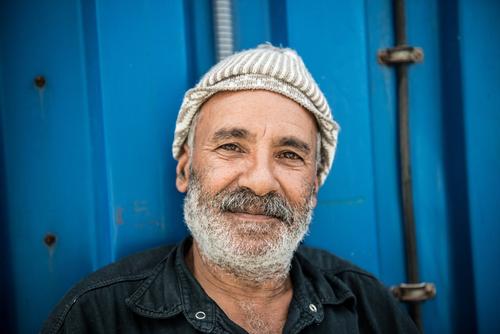
Zachariah
"Those of us who have come, have come this way because we have no other option."
"My parents were forced from Palestine in 1947 and moved to Syr in Lebanon. I fled from there to Benghazi in Libya in 1994. I worked as a carpenter for over 20 years. But now Libya is in bad condition and I also have some physical problems. I can’t find medical help and I can’t work anymore.
Before Libya was very good but now, in Benghazi there are a lot of problems. There are many people with guns and many militias in Libya who all fight against each other and us small guys, Bangladeshis, Pakistanis, Palestinians, Ghanaians and other Africans are caught in the middle.
They come at you and ask how much money you have and take it all. They shoot you, they burn you, they slap you. They abuse your body and very violent. If you have a daughter and they see her in the road, and they like her, they will come at night and rape her in front of you. There are thieves everywhere – they took my car, my money, my documents but there’s nothing you can do. There’s no police, no army and there are no rules at all. Nobody can help you. The worst is in the streets, especially in the evening, from 6pm onwards, if you work late you meet a lot of bad people on the way back home. You never know what they will do.
One year ago, I made the decision to take my family to Europe but being Palestinians, we had document problems and it was impossible to leave. Those of us, who have come, have come this way because we have no other option. The rest of my family is still in Benghazi, but there was not enough money for all of us to leave.
When I first got into the boat I thought I would die. But I thought, look, if God decides that I will die at sea, I will die at sea. Now, I want to go to Sweden or to Norway."
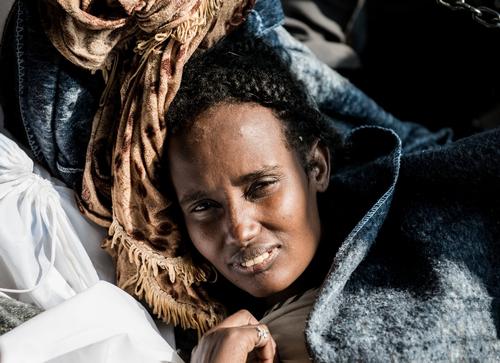
Agnes
"I was beaten with bare hands, with sticks, with guns."
"I left Eritrea four years ago with my husband. My husband was made to serve in the army, and he couldn’t provide for us. If he left the army, he’d be put in jail. Many people go to jail for no reason in Eritrea.
When we left we went to Sudan. We spent three years going from place to place, looking for work and trying to make enough money to come to Europe. Finally we made a bit of money, but it wasn’t enough for all of us, so I left with my daughter. My husband couldn’t come with us.
Crossing the desert between Sudan and Libya was very difficult. It took seven days, non-stop, in an overcrowded car.
After crossing the border, we moved from one town to the next until we arrived in Tripoli. We travelled in containers, like animals or objects. It was very dark and hot in the containers. Many people fainted because of the heat, and some died.
Libya is a very dangerous place. There are a lot of armed people. Some of them are Daesh. They kill a lot of people and carry out a lot of kidnappings.
When we arrived in Tripoli they put us in a house with 600 to 700 other people and locked us in. We had no water to wash ourselves, we had very little food and we were forced to sleep one upon the other. It was very difficult for my daughter – she fell sick many times.
There was a lot of violence. I was beaten with bare hands, with sticks, with guns. If you move, they beat you. If you talk, they beat you. We spent two months like that, being beaten every day.
They asked us to pay to go to Europe, so I paid US$1,700 for me and my daughter. We were lucky because women and children were put on the deck of the boat. The people below were in the dark and it was really hot down there. I could hear some of them saying they couldn’t breathe.
I knew that the journey would be very dangerous and difficult, especially for my daughter. But what was the alternative? We could not survive in Eritrea or Sudan. Our government does not allow people to leave. With our documents in Eritrea, there was no other way for us to get to Europe."



